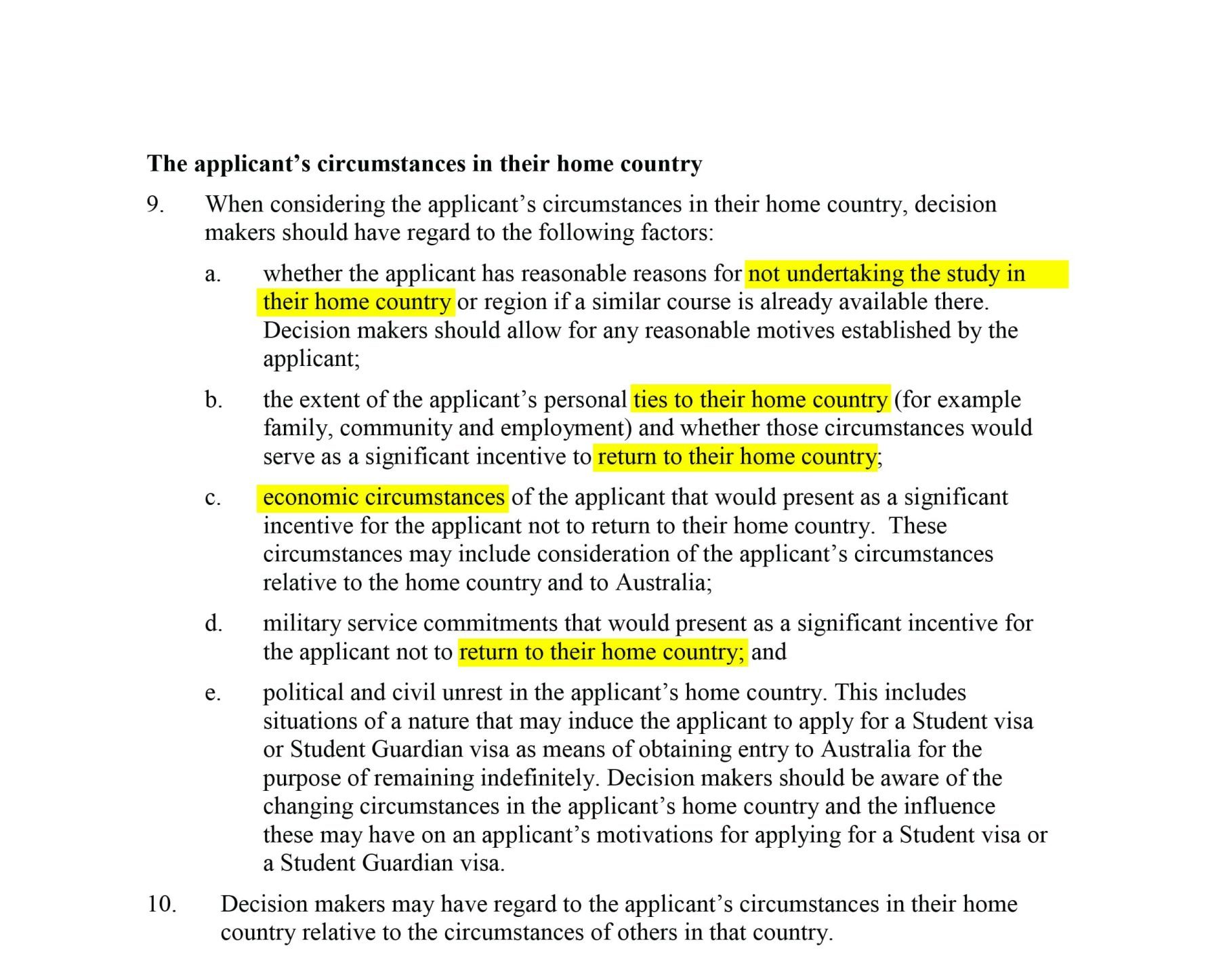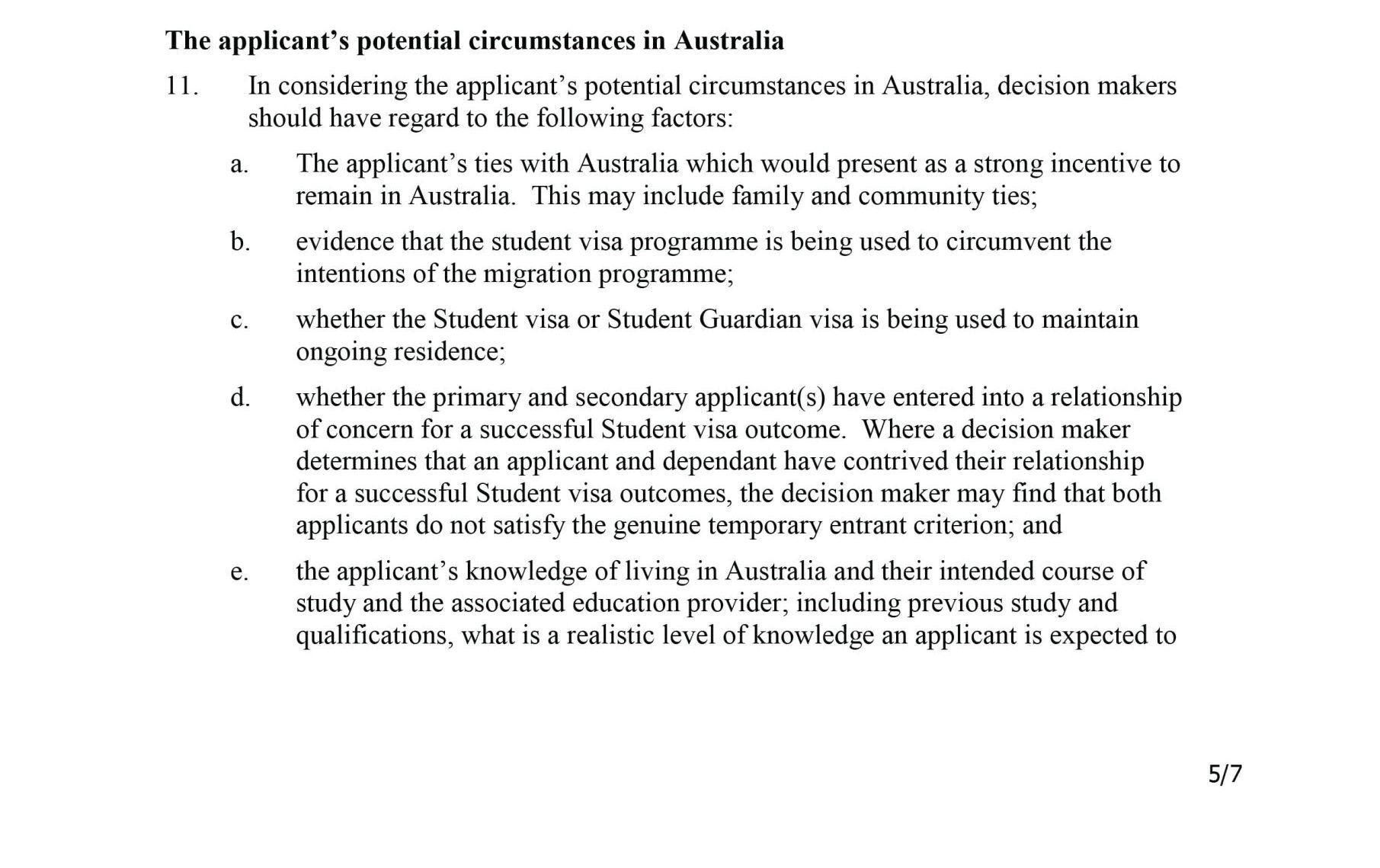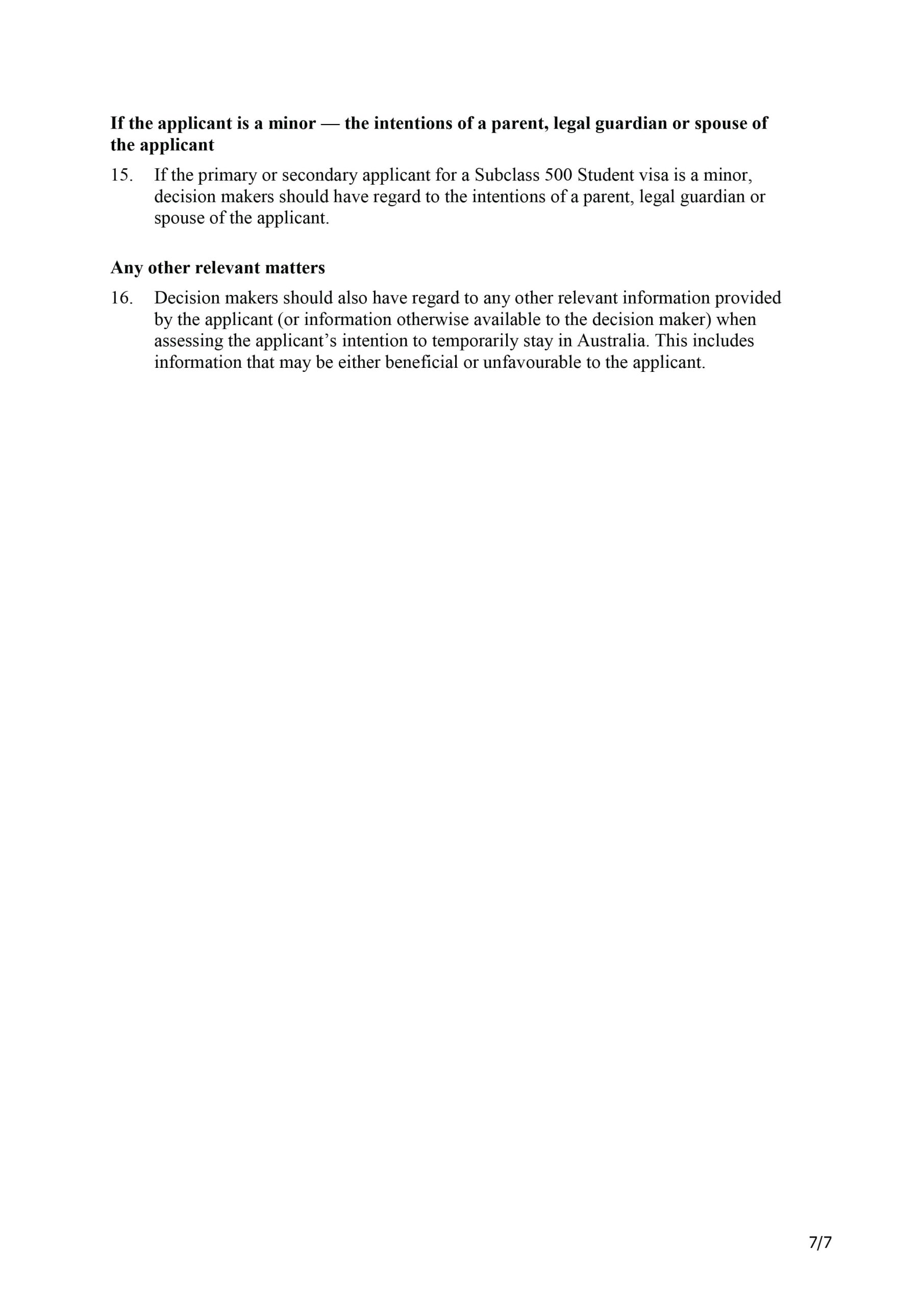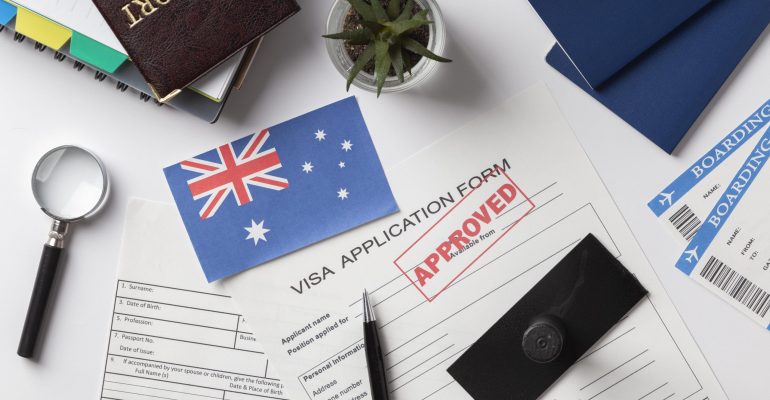Genuine Temporary Entrant Statement (GTE): How It’s Assessed, Requirements, and More
April 25, 2023 2023-05-12 5:57Genuine Temporary Entrant Statement (GTE): How It’s Assessed, Requirements, and More
Are you looking to study in Australia? The purpose of this guide is to help students whose student visas are about to expire, and are looking to extend their current visas. Documentation is required for the student visa extension. The Genuine Temporary Entrant Statement (GTE) is required for the visa application.
This guide will walk you through the process of writing a GTE statement including important information that should not be missed out – whether you are applying for a visa extension or applying for the first time, we have you covered.
What is a GTE Statement?
GTE stands for Genuine Temporary Entrant. The GTE statement is a mandatory component of your student visa. It serves two purposes:
- Your confirmation to the Department of Immigration and Border Protection that you will be studying in Australia on a temporary basis, and;
- You will return to your home country after your studies, and not immigrate to Australia or illegally stay in Australia.
While it is understood that some students may plan to immigrate to Australia after their graduation, your intention to immigrate to Australia must not be mentioned in your GTE statement. The statement requires you to show that you have significant incentives to return home after your studies.
This does not mean that the GTE prevents you from staying in Australia after your graduation, but rather you must only include details of your study plans.
You might be asking what information is needed in a GTE statement. After going through this guide, you should have a clear understanding on the criteria needed for a credible GTE.
How Will My GTE Be Assessed?
The Ministerial Direction Number 69 – Assessing the Genuine Temporary Entrant Criterion for Student Visa and Student Guardian Visa Application contains guidance from the Minister of Immigration and Border Protection, Peter Dutton, on how visa officers process student and guardian visas.
Click the link below to view the Ministerial Direction 69:
https://immi.homeaffairs.gov.au/Visa-subsite/files/direction-no-69.pdf


The preamble mentions the term ‘stay in Australia temporarily’ a few times. In other words, when visa officers read your application, they do not want to read about your intention to stay in Australia, even if you may be able to successfully immigrate in the future.
The visa officer will decide whether or not to grant your visa. Depending on your situation, immigration history, or if you are the guardian of the dependent.
In the Direction below, there is explanation on some of the points that the visa officer looks at to assess and evaluate student visa applications.

The visa officer will not use the factors specified in this Direction as a checklist for visa application assessment, but rather, these listed factors are intended as a guide for the student visa application process.
The visa officer may request additional information and evidence from the applicant to prove that they do not intend to immigrate to Australia after they have completed their studies. Dutton places emphasis in 4(c), on applicants who intend to study in a field unrelated to their previous education or employment, from whom the visa officer has every right to request further evidence to justify their purpose for coming to Australia.
These students in question need to carefully explain why they chose a field unrelated to their educational and employment background. We will go into detail further down in this post on how you can avoid writing an unconvincing explanation in your GTE statement.
Essentially, when assessing a GTE statement, the visa officer will evaluate the following:
- The applicant’s circumstances in their home country
- The applicant’s potential circumstances in Australia
- The value of the course of study to the applicant’s future
- The possibility of the applicant’s intention of maintaining a residence in Australia
- The applicant’s immigration history
- If the applicant is a minor – the intentions of a parent, legal guardian, or the spouse of the applicant
- Any relevant matters
Now, we shall go through each of these factors and how the visa officer should take them into account during your student visa extension or application.

Home Country
- Reasons why the applicant does not wish to undertake a course of study in their home country.
- The applicant’s personal ties to their home country (incentive to return to their home country after the completion of their studies).
- The applicant’s financial circumstances (incentive to work in Australia after the completion of their studies).
- The applicant’s military service commitment (incentive nor to return to their home country).
- An incentive to illegally stay in Australia due to political and civil unrest in the applicants’ home country.

Potential Circumstances in Australia
- The applicant’s ties with Australia (incentive to remain in Australia after the completion of their studies), which includes family and community ties.
- Whether the student visa is being used to hide the applicant’s intention to immigrate to Australia.
- Whether the student visa is being used to maintain residency in Australia.
- Whether a relationship between the primary applicant and the sub-applicant was made for a successful student visa outcome.
- The applicant’s knowledge of living in Australia, their intended course of study and education provider, their previous qualification, and the level of research the applicant has undertaken into their course of study and living arrangements.

Future
- Whether the applicant’s undertaken course would help the applicant to obtain an employment or employment promotion in their home country (avoid presenting the potential of employment in Australia in your GTE, as this would be regarded as having immigration intention).
- The relevance of the course to the applicant’s past or future employment in their home country or any other country.
- The salary that the applicant would expect to receive in their home country, or a third country after the completion of their studies (compared with the salary in Australia). Also, compare the salary expected in the home country if the applicant received a qualification within their home country.
Immigration History
The visa officer should also verify the applicant’s visa and travel history, including countries other than Australia. This is done in order to check if the applicant had previously held a visa that was cancelled, or if they failed to comply with another country’s immigration laws.

Under 18 Years of Age
If the applicant is under 18 years of age, the visa officer should assess the applicant’s parents, legal guardian, or sponsor’s intentions.
It’s important to reiterate that the factors that a visa officer will look at when assessing the applicant’s GTE statement may include but are not limited to the above factors. Do keep this in mind for your own GTE statement.
Overview of a Credible GTE Statement
In overall, a credible GTE statement should include the following content:
- A personal introduction including your family, financial condition, education, and employment background.
Your GTE statement should prove that you have enough funds to support yourself financially without the need to work part-time during the study period. You need to make sure you avoid statements that reflect an intention to immigrate in the future. Do contact your immigration agent for further information and advice. - Your reasons for studying in Australia rather than in your home country.
It is no secret that the education system in Australia opens doors to many career pathways. You could mention that studying in Australia would broaden your horizons and improve your English competency. You can praise the education system in Australia. However, be mindful not to overpraise Australia. This could lead to reflecting an intention to immigrate, even if you did not intend to. Which will lead to your visa being rejected. - Your reasons for choosing your education provider.
You need to specify why you chose your education provider over the others. Let’s use Rosewood International College as an example. You could say that Rosewood International College Is a private college with the best facilities in Australia that offers multidisciplinary courses.
You could say that Rosewood International College is equipped with 2 state-of-the-art kitchens, and is a registered training organisation recognised by the Australian government. Statements like these will prove to the visa officer that you have put in considerable thought and effort into finding out your ideal education provider.
Always assess other education providers in your GTE statement to prove that you are well-informed about your chosen education provider, and explain why it is a better option over the other providers. This serves to convince the visa officer that you have prepared for your studies in Australia. - Your reasons for choosing to undertake the course of study.
You could relate your course of study with your previous education or employment. For example, you want to expand your knowledge in your area of study, or you want to upskill in the industry that you were previously involved in.
If you have expressed interest in your chosen area of study for sometime, add that to your GTE statement. It adds plenty of value as it tells the visa officer why this course of study is important to you. Do contact your education agent for further information should you need assistance. - Value the course to your future employment.
You are required to state your intention to return to your home country right after completing your studies in Australia. Do not say that you plan to work in Australia to accumulate work experience, as this may sound like you intend to immigrate to Australia.
Here are some important questions you should answer:
- What jobs are available to you once you return home?
- What new developments in your country would need the skills and qualifications you will have once you have completed your qualification?
- How would living in an English speaking country help you get a job in your home country?
Your GTE statement should contain all the points above, which will be evaluated by the visa officer to assess your purpose for coming to Australia.
If you are a gap year student or working holiday visa holder, we recommend that you pay particular attention to the following section when writing their GTE statement.
Gap Year Students
“Gap Year Students” refers to applicants who are on a break from formal education to work or travel after the completion of their previous studies. In this case, it means that the applicant experienced a period of not undertaking any studies before applying for a student visa to study in Australia.
As an example, Student A has planned to undertake a course of study in cookery and hospitality in Australia after completing their high school education. During their time spent preparing for the IELTS test, they found a job to work as a cook in a local restaurant. They work as a cook to gain work experience.
One year later, Student A applied for SIT50422 Diploma of Hospitality Management in Rosewood International College. Student A, being an applicant who took a gap year, should explain in their GTE statement why they chose to study after being previously employed.
You should be aware that an unconvincing statement will give an impression that you might be inclined to reside in Australia after your course of study, thereby putting your visa application at risk of being rejected. Avoid this by clearly explaining why you took time off between your studies.
Here is a summary of factors that gap year students should consider:
- If your chosen course of study IS related to your employment background:
You only need to state your aspiration for further development in this industry, and how your chosen course of study will assist you in reaching the goal. Show proof of your employment background when possible.
- If your chosen course of study IS NOT related to your employment background:
You should explain why you have chosen the course of study rather than a course related to your previous employment. For example, you could say that your accumulated working experience during your gap year has helped you find your preferred field of studies.
- Your chosen course of study IS related to your educational background:
Applicants in this situation will not be affected by their working experience unrelated to their chosen course of study, as long as they prove their intention for further education in the same field of study. The employment during the gap year can be explained as a way to gain valuable work experience to be job-ready.
- Your undertaken course IS NOT related to your educational background:
You must be careful when writing your GTE statement and clarify the reasons why you applied for a new field of study rather than choosing a course of study similar to your educational background. It is not uncommon for students to apply for courses that can lead to immigration outcomes, such as a chef, mechanic, or childcare centre manager. Under this situation, we strongly suggest you prove that you want to gain extra professional skills which could boost your employment potential in your home country.
Working Holiday Visa Holders
The Working Holiday Visa (subclass 417), or WHV, allows visa holders to work, study, and travel in Australia. The WHV serves to provide young adults who want to spend their holidays in Australia the opportunity to work here to fund their holiday. Many visa holders fall in love with Australia and hope to reside in this country while travelling around. There are a few other pathways towards staying in Australia, but depending on your situation, these might not be the best choice.
Innovation and investment immigration requires plenty of funds; studying in universities is costly and requires a high IELTS score; a partner visa may bring major problems if you chose the wrong person to hold a partner visa with.
A great option is to study a course that is related to an occupation on the skilled occupation list at a vocational education provider.
As one of the best private vocational education colleges in Australia, Rosewood International College offers a variety of courses ranging between AU $3,000 – AU $22,600 to help you fulfil your dream!
If you’d like more information on which courses have the potential to lead to an immigration outcome, do contact our course consultant.
WHV holders can submit their student visa application in Australia and overseas, but there are underlying factors that you need to be aware of.
For example, how can you adequately express your aspirations to study instead of immigrating? Here are a few things you need to know before applying for your student visa:
- Choose a nationally recognised and reputable vocational education provider
There are many vocational education providers in Australia that are not recognised by the Australian Government. You should always ensure that your desired school is registered with the Australian Government’s CRICOS system, as unregistered education providers are not qualified to educate. Choosing a reputable vocational education provider proves to the visa officer that you intend to pursue your studies in Australia, and reduce any doubts that you have intentions to reside in Australia after your studies.
Rosewood International College is a CRICOS-accredited education provider. We are regarded as one of the best private vocational education providers in Australia.
- Choose a course of study that is related to your employment during the working holiday period
The visa officer will evaluate the relevance of your chosen course of study and employment background when processing your student visa application. If your chosen course of study is unrelated to your employment, you must provide solid reasoning to convince the visa officer of your intentions; an unclear statement may cause a visa refusal due to the lack of evidence to prove your genuine temporary entrance.
- Reasons for choosing to study in Australia instead of in your home country
You can indicate that you are well-prepared for studying in Australia by stating that you have expressed your interest in your chosen area of study for some time, or acknowledge the advantage of the Australian education system as being globally recognised.
Remember not to overpraise Australia as a great place to live and work – which could be seen as an intention for immigration.
Wrapping it Up
The GTE statement is an important visa application document. Careless or insufficient preparation for your GTE statement may jeopardise your visa application and risk your visa being rejected.
The GTE statement is the fastest way for a visa officer to know an applicant’s background, their purpose of stay, and career plan. It is important to word your GTE carefully and accurately.
Whether you are extending your student visa or applying for one, we highly suggest you take the time to compose your GTE statement carefully. Pay close attention to its structure, logic, and content. We recommend those without GTE writing experience to contact your education and immigration agent, where you can find more information.
Choose to study with Rosewood International College to discover your potential and talents!
Visit our website to learn more about our courses, or view our latest promotions:
https://rosewood.nsw.edu.au/about-us
Contact our Commercial Sales Team: adam@rosewood.nsw.edu.au
*The information within this post is correct at the time of publication. For the most up to date information please refer to the Australian Government’s Home Affairs website. Rosewood International College does not commit to securing migration or education assessment outcomes for overseas students. We strongly advise that you consult with a registered migration agent if you require further information.
Rosewood International College is a Registered Training Organisation RTO Code: 45945 | CRICOS Provider Code 04083D




